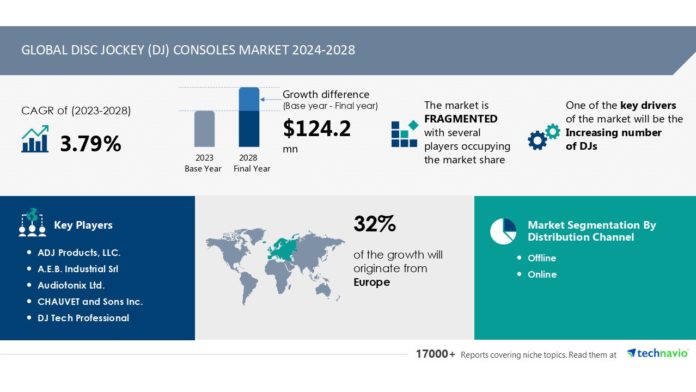The global disc jockey (DJ) consoles market size is estimated to grow by USD 124.2 million from 2024-2028, according to Technavio. The market is estimated to grow at a CAGR of almost 3.79% during the forecast period. Increasing number of djs is driving market growth, with a trend towards growing number of new dj console launches. However, high cost of dj consoles poses a challenge. Key market players include ADJ Products, LLC., A.E.B. Industrial Srl, Audiotonix Ltd., CHAUVET and Sons Inc., DJ Tech Professional, Epsilon, Five Core Electronics Ltd., Global Distribution GmbH and Co. KG, Guillemot Corp. SA, IK Multimedia Production Srl, inMusic Brands Inc., Innovative Concepts and Design LLC, KORG Inc., Music Tribe Global Brands Ltd., Native Instruments GmbH, Noritsu America Corp., Rane Holdings Ltd., Roland Corp., VXK Inc., and Yamaha Motor Co. Ltd..
The global DJ consoles market is experiencing growth due to ongoing technological advancements. New product launches, such as InMusic Brands Inc.’s ONE motorized DJ controller, are driving market expansion. The ONE features motorized 7-inch turntable platters for enhanced performance and supports popular DJ software platforms. These technological improvements aim to deliver superior sound, seamless connectivity, and high-quality instruments to DJs. The continuous introduction of innovative products is anticipated to boost the growth of the global DJ consoles market throughout the forecast period.
The DJ console market in the audio equipment industry is thriving, with trends leaning towards digital platforms. Turntables and CD players are being replaced by digital media players and software platforms for beatmatching and scratching. Professional-grade consoles offer advanced mixing capabilities, while entry-level consoles cater to leisure activities. Seamless connection to digital platforms like laptops, tablets, streaming services, and social media is essential. AI-powered beatmatching assistants, automated track transitions, and smart song recommendations are transforming the DJ experience. DJ consoles are no longer just for music festivals and corporate events, but also for techno musicians and producers in various music genres. Portability, connectivity, and mixing capabilities remain key factors. The market includes DJ Controllers, Mixers, Media Players, Turntables, and consoles of various price points – Low-end, Mid-range, and High-end, as well as Analog and Digital options. Electronic musical instruments like DJ consoles continue to evolve, catering to the needs of sound engineers and live music producers.
The cost of DJ consoles and their accessories is a significant barrier to their wider adoption due to their high retail prices. Modern DJ consoles utilize advanced sound technology, making them expensive electronic musical instruments. The DJ system’s overall cost ranges from USD3,000 to USD5,000, with the DJ controller being the most expensive component, priced between USD500 and USD2,000. A DJ mixer follows closely, costing between USD300 and USD1,500. Other components, such as media players and turntables, account for approximately 30-35% of the total cost. The cost of a DJ console depends on its brand, variant, and features, including quality, functionalities, user interface, connectivity, and price. Consequently, the high cost of professional-grade DJ consoles restricts their accessibility to the mass market, potentially hindering the growth of the global DJ consoles market.
The Disc Jockey (DJ) console market faces several challenges from emerging technologies and changing consumer preferences. Laptops and tablets have gained popularity for their portability and digital workflow, threatening traditional DJ consoles. Streaming platforms and AI-powered beatmatching assistants, automated track transitions, and smart song recommendations are also disrupting the market. DJ consoles must adapt to these trends while maintaining their unique value proposition. For music festivals and corporate events, high-end DJ consoles with advanced mixing capabilities remain essential. Sound engineers and live music producers require professional-grade equipment, including DJ Mixers, Media Players, Turntables, and DJ Controllers. However, low-end consoles cater to leisure activities and techno musicians producing electronic music genres like trap and electronic dance music. Connectivity and portability are crucial factors for DJ consoles, with digital DJ consoles offering more flexibility than their analog counterparts. The market segments include DJ consoles based on price points: low-end, mid-range, and high-end. Electronic musical instruments and social media are also influencing the market dynamics.
The offline segment plays a significant role in the global disc jockey (DJ) consoles market, providing customers with the opportunity to personally examine and purchase DJ consoles. Brick-and-mortar retail stores specializing in musical instruments, pro audio equipment, and DJ gear are prominent offline sales channels. These stores allow customers to test DJ consoles, assess build quality, and receive expert advice from knowledgeable staff. Dedicated pro audio and DJ equipment stores cater to professional DJs and music producers, offering a wide range of DJ consoles and related equipment. Offline events, such as trade shows, music expos, and DJ workshops, serve as platforms for showcasing and selling DJ consoles. Lastly, offline secondhand markets provide opportunities to buy and sell used DJ consoles, offering more affordable options and access to vintage or discontinued models. These offline sales channels offer personal interaction, hands-on experience, and expert guidance, contributing to the growth of the offline segment in the global DJ consoles market.
The DJ consoles market encompasses a range of audio equipment designed for mixing and performing music. Key components include turntables, CD players, digital media players, mixers, software platforms, and various controllers. Beatmatching and scratching are essential skills for DJs, enabling seamless connection between tracks and creative transitions. Portable and wireless consoles offer flexibility for various events, from music festivals to corporate functions. Digital workflow and streaming platforms have revolutionized the industry, allowing for online streaming and AI-powered mixing. DAWs (Digital Audio Workstations) and beatmatching assistants streamline the production process. High-end consoles offer advanced features, while mid-range and low-end consoles cater to beginners and budget-conscious users. Sound engineers and live music producers often use professional-grade DJ consoles for large-scale events. Innovation continues with smart recommendations and automated transitions. However, high cost and limited availability can hinder market growth. The market serves diverse clientele, from creative entertainers to professional DJs, ensuring continuous evolution and demand.
The DJ consoles market is a vibrant segment of the audio equipment market, catering to the unique needs of disc jockeys (DJs) and music producers. It includes a range of equipment such as turntables, CD players, digital media players, mixers, and software platforms. These tools enable DJs to perform various techniques like beatmatching and scratching, and offer seamless connection with digital platforms, laptops, tablets, and streaming services. Professional-grade consoles deliver superior sound quality and advanced features, while entry-level consoles cater to beginners. The market is witnessing a shift towards digital workflows, with AI-powered beatmatching assistants, automated track transitions, and smart song recommendations. DJs perform at various events, including music festivals, corporate events, and social media platforms. They use DJ controllers, mixers, media players, and turntables. The market offers a diverse range of consoles, from low-end to high-end, analog to digital, and portable to professional-grade. DJ consoles are not just limited to music genres like techno and electronic dance music but are also used by sound engineers, live music producers, and techno musicians for leisure activities and electronic musical instruments like trap music.







